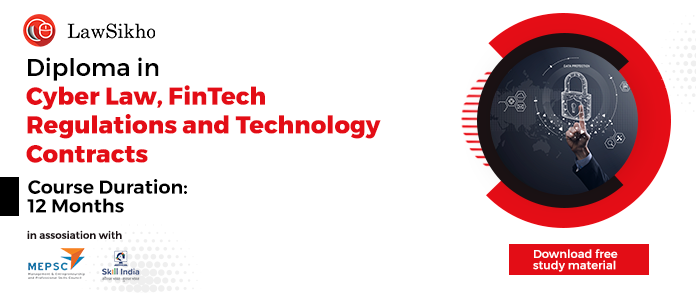This article is written by Ishan Arun Mudbidri from Marathwada Mitra Mandal’s Shankarrao Chavan Law College, Pune. This article talks about the regulation of edTech companies under the E-commerce Rules, 2020.
Table of Contents
Introduction
The advancement in technology has changed people’s lives completely. The 21st century has seen the meteoric rise of e-commerce and e-business which has given the consumers more options and has also reduced the geographical distance. Moreover, today as the world is witnessing a global pandemic, people are left with no choice but to buy things online. Shopping online has made things easier for consumers. Products are delivered at your doorstep, there is a product return policy, various sources of payment, and also a customer grievance mechanism to resolve any inconvenience caused. Hence, with the growing popularity of e-commerce, there was a need to regulate it to protect the rights of consumers. Therefore, the Indian government introduced the Consumer Protection (E-Commerce) Rules, 2020.
Apart from shopping, even education has gone online. The edTech companies have become the new way of learning for students, hence these companies are growing in numbers day by day. This article talks about the need to regulate the edtech companies in India and the various provisions given in the new Consumer Protection Rules related to this industry.
What are edTech companies?
As the name suggests, edTech means the combination of education and technology to provide learning to the students. It is a way of making learning fun and interactive. Each student’s learning capabilities are different and it becomes difficult for the teachers to cope with the pace of each student. With edTech, each student can learn at his/her own pace and style. Tools provided by edTech make it easier for teachers to create individualized lesson plans and learning experiences that foster a sense of inclusivity and boost the learning capabilities of all students, no matter their age or learning abilities. However, there are two sides to a coin. Hence, edTech companies also have some negatives.
- These companies provide online learning, which means the students have to sit in front of a screen like a phone or a laptop for hours. This can cause a strain in the eyes of the students.
- Constantly sitting in one place for an hour or two hours can be boring and may impact the students’ attention span.
- The teachers create an atmosphere where the students can learn together and perform various other activities along with their peers which currently does not fall within the scope of edTech.
This mixture of software, hardware, and teaching is still in the development stage. With time, edTech will improve.
Is education a ‘service’?
The term ‘service’ is defined in Section 2(1)(o) of the Consumer Protection Act, 1986. It means service of any kind made available to the users and includes, jobs like banking, financing, insurance, transport, processing, supply of electrical or other energy, board or lodging, housing construction, entertainment, amusement, or the purveying of news or other information, but does not include services that are free of charge or under a contract of personal service. Service under this definition means any type of service done in exchange for some consideration of fees. This definition has a vast scope and is not conclusive. This has become a point of debate with people having conflicting views.
The Indian judiciary also has been sceptical regarding this issue. In the case Maharshi Dayanand University v. Surjeet Kaur (2010), the Supreme Court observed that education and educational institutions have not been providing any kind of service in terms of admission, fees, etc. which could not be entertained under the purview of the Consumer Protection Act, 1986. Similar views were observed in the case P.T. Koshy & Anr. v. Ellen Charitable Trust & Ors. (2012), where the Supreme Court held that students are not ‘consumers’, ‘education is not a commodity and educational institutions are not rendering ‘service’. Hence, the status of education as a service under this act has been a conflicting issue. The status of a student as a consumer also has been an issue.
Are students consumers?
The term ‘consumer’ has been defined in Section 2(1)(d) of the Consumer Protection Act, 1986. It states that a consumer is a person who buys any goods for consideration or hires/avails any services for consideration. A student avails of the services given by the educational institutions in exchange for a particular amount of fees which stands as consideration. So can a student be considered a consumer under this Act? In the case Anand Institute of International Studies v Sanni Jaggi & Ors. (2019), the students were aggrieved by an institution due to lack of basic educational facilities and false advertisement misleading them to undertake admission in such institution. It was further found that the institution also lacked required affiliations and was continuing operations without getting the same. The National Consumer Dispute Redressal Commission (NCDRC) upheld the decision of the District Forum and State Commission which ruled in favour of students observing that inadequate facilities amount to deficiency in services and false advertisement further promotes unfair trade practice.
Hence, there are two views. According to one view, education and students should not be recognized as being under the Consumer Protection Act. The other view states that they should be recognized. This issue was again raised in a recent matter, Manu Solanki v. Vinayak Mission University (2020), where the question that was asked was whether educational institutes should fall under the ambit of the Consumer Protection Act, and the Supreme Court is yet to deliver a judgment.
Consumer Protection (E-Commerce) Rules, 2020
The Consumer Protection Act, 1986 was superseded by the Consumer Protection Act, 2019, which came into force on 20th July 2020. This Act had a wider scope and brought e-commerce under its ambit. This Act was much needed considering the rapid growth in technology. In furtherance of this Act, the Consumer Protection Rules, 2020 were brought in by the government on July 23rd, 2020, to control the unfair trade practices in e-commerce.
Key features
A separate entity
The Consumer Protection Act, 2019 and the new Rules of 2020, both define e-commerce as a separate entity. Section 2(16) of the Act defines e-commerce as buying and selling of goods or services on a digital platform. Under the E-commerce Rules of 2020, e-commerce entities are defined in Rule 3(b) of the Rules. It states that an e-commerce entity means any person who owns, or operates his/her business on a digital platform, but does not include a seller who sells his/her goods on a marketplace e-commerce entity.
Scope of the Act
The Act extends to:
- All the goods and services are bought or sold online and also includes digital products.
- E-commerce entities are of two types – inventory e-commerce entities and marketplace e-commerce entities, which are defined in Rule 3(f) and Rule 3(g) of the Act respectively. Inventory e-commerce entities have been defined as entities that own the inventory of goods and sell such goods directly to consumers and include single brand and multi-channel brand retailers. Marketplace e-commerce entities have been defined as entities that provide information on an electronic platform for the buyers and the sellers.
- To keep checks on all forms of unfair trade practices across all e-commerce channels.
The scope of this Act extends to the e-commerce entities that are based abroad but offer their services for the buyers and sellers in India.
Disclosure of information
Under the new Rules of 2020, every e-commerce entity must provide information such as:
- Entity name;
- Address of every branch and main headquarters;
- Details of its website;
- Contact details.
This will help the consumer in knowing about who he/she is dealing with and ensure absolute transparency.
Grievance redressal
Every e-commerce entity must have a grievance redressal mechanism and a grievance redressal officer. The details of this officer shall be made available to the consumers. This officer must take note of all the complaints and resolve them on a priority basis.
Legal entity
The new Rules of 2020 instruct all the e-commerce entities to be one of the following registered entities:
- The company should be incorporated under the Companies Act, 1956 or Companies Act, 2013.
- Foreign companies are covered under Section 2(42) of the Companies Act, 2013.
- Office, branch, or agency outside India owned or controlled by a person resident in India is covered under Section 3(v)(iii) of the Foreign Exchange Management Act, 1999.
Unfair trade practices
An e-commerce entity is prohibited from adopting any unfair trade practice whether in the course of business on its platform or otherwise. Further, an e-commerce entity is also prohibited from manipulating the price of the goods or services offered on its platform in such a manner as to gain unreasonable profit by imposing on consumers any unjustified price having regard to the prevailing market conditions. However, it remains unclear as to what constitutes price manipulation. E-commerce companies should also keep a check on their employees so as to make sure none of their employees are dealing with any unfair trade practices.
Further, the e-commerce entities are required to deliver the goods and there must be the authenticity of goods. The entities should bear adequate liabilities and should not refuse to take back goods agreed to be purchased. An e-commerce entity is further prohibited from imposing cancellation charges on consumers after confirming the purchase unless such charges are also borne by the e-commerce entities upon unilateral cancellations.
Regulation of edTech companies
All the edTech companies in India have been on the rise. These giants, like Byju’s, Unacademy, Upgrad, and others make for a total market size of around $800 million and are headed for 10 times the growth in 5 to 10 years. As per IBEF’s Indian Education Sector Industry Report of August 2020, India has already become the second-largest market for e-learning in the world, after the US. The new Rules of 2020 will make the various companies follow the various provisions that are given. The consumers have a separate grievance redressal mechanism to register complaints against these companies. However, one essential point in these rules is that services that are given free of charge are not mentioned in this Act. Companies like Youtube and other online platforms which provide free certificate courses do not come under this Act. All the edTech companies have become a medium of exchange hence inviting regulations. They fall under the definition of the Act as they provide educational skills and training in consideration of fees. However, the Consumer Protection Law does not exclusively mention what rules are directly applicable to edtech companies.
EdTech and data privacy
Any completely online-based platform is always at risk of data breach or hacking. Many edTech companies are the most vulnerable in this regard. Consumers have to give their personal information to these companies to avail their services. Usually, in the case of edTech companies, the consumers are young students who do not have adequate knowledge and awareness regarding data protection. This puts the students in a vulnerable state as they are not informed enough to understand the implications of giving consent to such privacy policies.
Conclusion
The COVID-19 pandemic has opened the window of opportunities for edTech companies. With schools and colleges shut down, the edTech companies seem to have grabbed the spotlight. This attracted investors, funding, users from all around the world. In 2020, the edTech industry has attracted around $1.4 billion in funding. With such a huge demand in society, regulation of these companies seems vital. However, with various provisions given the consumer protection rules seems to have answered questions on the regulation of these to a large extent. These rules aim to bring transparency and accountability and provision for a grievance redressal mechanism to the consumers. However, some areas are yet to be filled and only time will tell whether they will be or not.
References
- https://www.mondaq.com/india/dodd-frank-consumer-protection-act/995148/the-consumer-protection-e-commerce-rules-2020-
- http://www.businessworld.in/article/Consumer-Protection-E-commerce-Rules-2020-A-blessing-for-Consumers/12-01-2021-364776/
- https://www.indialawjournal.org/edtech-companies-under-the-consumer-protection-rules-2020.php
- http://14.139.60.114:8080/jspui/bitstream/123456789/12784/1/020_Is%20Student%20Consumer%20and%20Education%20Service%20under%20the%20Consumer%20Protection%20Act%2C%201986%20%28415-420%29.pdf
- https://www.dnaindia.com/analysis/column-is-education-a-service-or-business-the-debate-continues-1889100
- https://consumeraffairs.nic.in/sites/default/files/E%20commerce%20rules.pdf
- https://economictimes.indiatimes.com/tech/technology/indian-edtech-industrys-market-size-to-reach-30-billion-in-10-years-report/articleshow/82295097.cms
- https://www.analyticsinsight.net/top-10-edtech-startups-shaping-the-indian-education-industry/
LawSikho has created a telegram group for exchanging legal knowledge, referrals, and various opportunities. You can click on this link and join:
https://t.me/joinchat/J_0YrBa4IBSHdpuTfQO_sA
Follow us on Instagram and subscribe to our YouTube channel for more amazing legal content.
 Serato DJ Crack 2025Serato DJ PRO Crack
Serato DJ Crack 2025Serato DJ PRO Crack











 Allow notifications
Allow notifications


